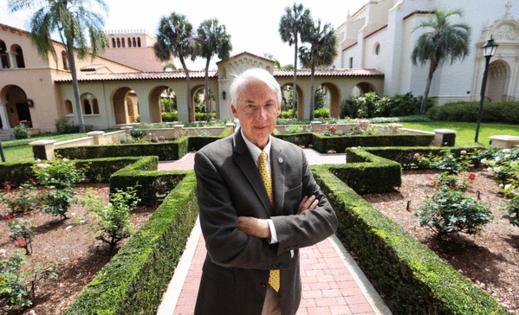Rollins College president speaks out against Trump higher-ed attacks
Published in News & Features
ORLANDO, Fla. — The president of Rollins College retires in June, and Grant Cornwell is using his last months in that role to speak out against President Donald Trump’s attacks on education.
In February, he hosted an academic freedom conference at the college’s Winter Park campus and last week college administrators released a statement — one conceived at that Rollins gathering — that condemned the Trump administration for its “unprecedented government overreach and political interference” in higher education.
Cornwell was one of more than 480 university presidents who signed the statement, adding his name to a list that includes leaders of Ivy League colleges, public universities such as Colorado State University and the University of Virginia, and a range of private institutions, from Duke University to Stetson University in DeLand.
The letter calls for the administration to end the “coercive use of public research funding” and comes as it has yanked billions of dollars in funding from Columbia and Harvard universities and threatened others if they do not change their policies.
The Trump administration says it wants to root out antisemitism, an issue made prominent during last year’s campus protests against the war in Gaza, and end “divisive” and “woke” programs at schools nationwide.
But critics like Cornwell see attacks on higher education funding ending in a dangerous place: Where colleges and universities would have to police their curriculum to such an extent that they could only teach what the government deems acceptable.
“That is the end of higher ed as we know it,” he said.
Cornwell has been president of the small liberal arts college since 2015, coming to Winter Park after an eight-year stint as president of College of Wooster in Ohio. Rollins has about 3,000 students.
Political statements normally run afoul of Cornwell’s philosophy for higher education. “It’s not the business of a university to have a foreign policy,” he said referencing the University of Chicago’s principles of free expression.
But when Trump’s actions attack the very bedrock of higher education — a space for free academic expression — Cornwell said keeping quiet was not an option.
“The intervention is an erosion of our integrity, and we can’t stand for that,” he said.
Research and teaching in higher education needs to be free of pressure to please leadership, from university presidents to U.S. presidents, he said, adding he feels a need to “protect” that space. Academic freedom creates better-informed citizens, which in turn creates a better democracy, Cornwell said.
The statement was released through the American Association of Colleges and Universities, whose president attended the Rollins conference two months ago.
It was released as Harvard, whose president signed the statement, fights the administration’s efforts to halt billions of dollars in federal funding and its demands that the university change its policies.
The Trump administration sent a letter to Harvard on April 11 claiming the university “failed to live up to both the intellectual and civil rights conditions that justify federal investment.” The letter demanded federal audits of academic programs, departments, viewpoints of students, faculty and staff as well as changes to the University’s governance and hiring, according to the letter.
Trump has continued his public attacks on the elite Massachusetts university this week, using his social media platform to call it a “threat to democracy,” a “liberal mess” and “truly horrific” and saying many of the nation’s other colleges are the same.
“Harvard is an Anti-Semitic, Far Left Institution, as are numerous others, with students being accepted from all over the World that want to rip our Country apart,” Trump wrote Thursday.
Harvard President Alan Garber said the university would not comply with the administration’s demands, and it has since filed a lawsuit against the Trump administration.
“The University will not surrender its independence or relinquish its constitutional rights,” Garber wrote in a message to the Harvard community. “No government — regardless of which party is in power — should dictate what private universities can teach, whom they can admit and hire, and which areas of study and inquiry they can pursue.”
The letter from the group of university presidents echoed Garber’s remarks.
“America’s colleges and universities prepare an educated citizenry to sustain our democracy,” the letter read. “The price of abridging the defining freedoms of American higher education will be paid by our students and our society.”
The group that gathered at Rollins in February wanted to “reclaim the narrative” on higher education, Cornwell said.
There are valid criticisms of the work colleges and universities do, Cornwell added, but they are being met with a disproportionate response from the federal government.
“It’s not like the critiques don’t land anywhere. We have to own that and address it,” Cornwell said. “What is the case though, is that the attacks and the undermining are hyperbolic and aggressive in ways that are completely uncalled for.”
Cornwell said he has the support of the Rollins community, from its board of trustees to its students. He said several Rollins alumni, students and faculty have thanked him for speaking up “for what Rollins stands for” and against Trump’s attacks on higher education.
The events of the last several months make it harder for Cornwell to step aside in a few months.
“I feel like I’m walking away from a set of issues that is so important,” he said. “That makes it difficult.”
--------------
©2025 Orlando Sentinel. Visit at orlandosentinel.com. Distributed by Tribune Content Agency, LLC.







Comments